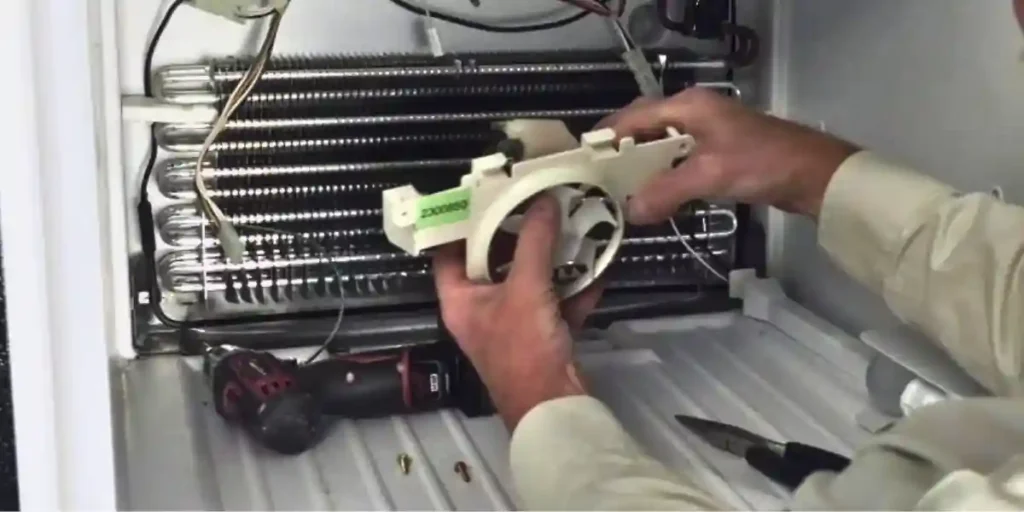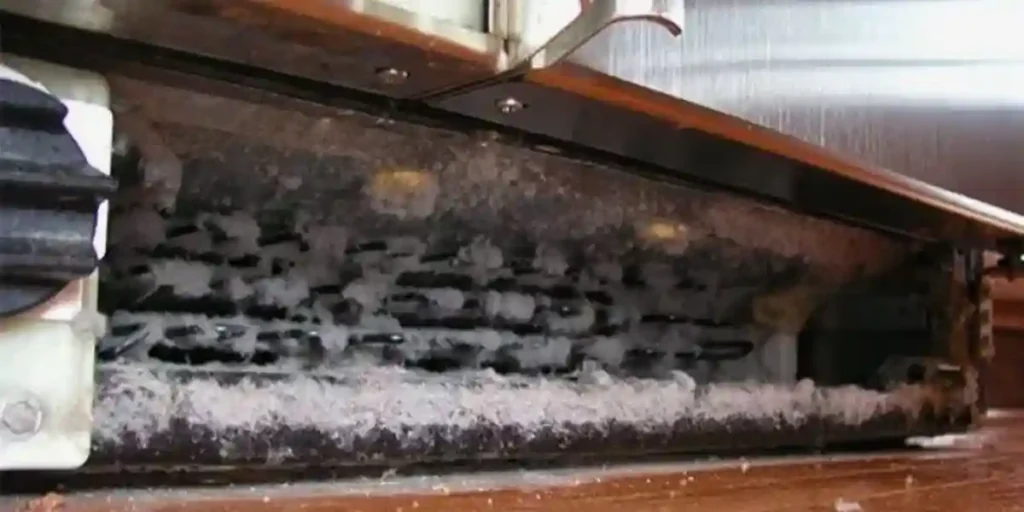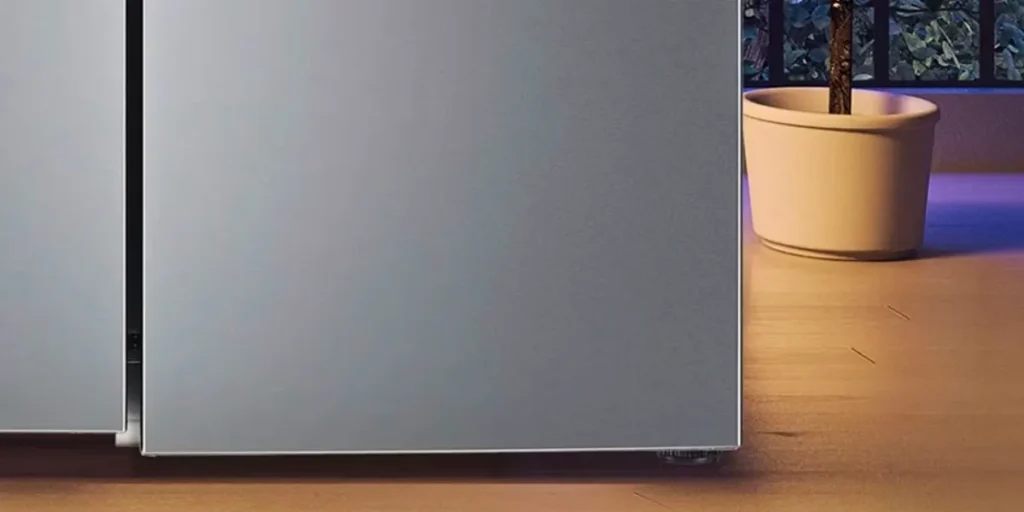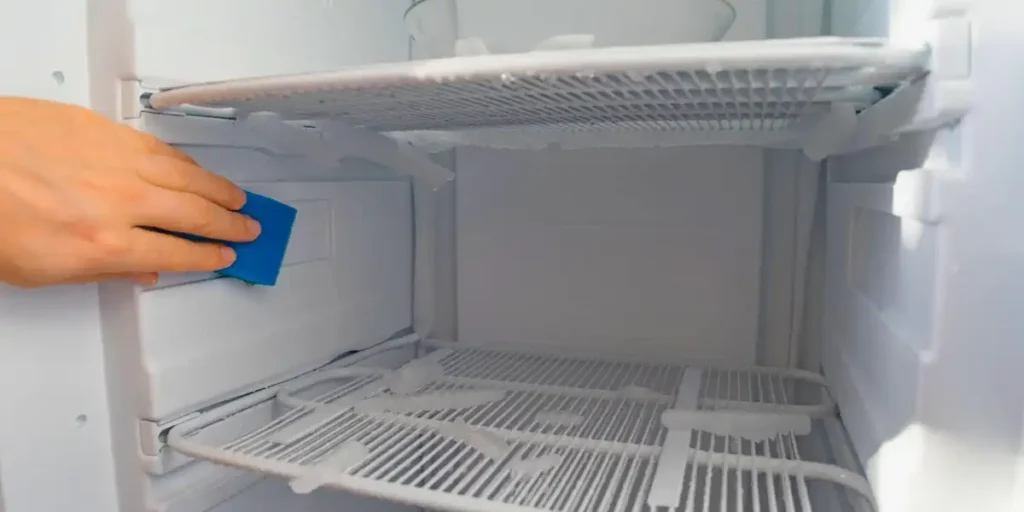Why Does Your GE Fridge Make Noise When the Door Is Closed? Quick Fixes!
We may earn affiliate fees for purchases using our links (at no additional cost to you).
Is your GE fridge making an unsettling noise every time you close the door? Don’t worry, you’re not alone.
Many GE fridge owners have experienced this issue and wondered what could be causing it.
In this article, we’ll dive into the reasons behind your GE fridge making noise when the door is closed and explore the potential solutions to bring back peace and quiet to your kitchen.
Let’s uncover the mystery of those strange sounds and find out how you can fix them.

Why Does Your GE Fridge Make Noise When the Door Is Closed?
Your GE fridge makes noise when the door is closed due to a couple of possible reasons: the evaporator fan motor or the damper control.
The evaporator fan motor may be hitting something, while the damper control might be malfunctioning.
Common Noises and Their Causes in a GE Fridge
When you hear strange noises coming from your GE fridge, it can be perplexing. Understanding the common noises and their causes will help you troubleshoot the issue effectively.
Here are some possible reasons for the noises:
1. Evaporator Fan Motor:

The fan motor can become clogged with debris, causing it to hit the ice or frost buildup. Cleaning or replacing the fan motor may resolve the noise.
2. Damper Control:
A malfunctioning damper control can lead to a noisy operation. It regulates the flow of cold air from the freezer to the refrigerator compartment.
If the damper control is faulty, it may create unusual sounds.
3. Compressor:
A vibrating or humming noise could indicate a problem with the compressor. Issues such as loose components or a faulty compressor motor can contribute to these sounds.
4. Condenser Coils:
Dirty or dusty condenser coils can cause your fridge to produce rattling or buzzing noises. Regular cleaning of the coils can help eliminate these sounds.
5. Water Valve:
If you hear a hissing or gurgling noise, it may be due to a faulty water valve. This valve controls the flow of water to the ice maker or dispenser and may need to be inspected or replaced.
Potential Risks Associated with Noisy GE Fridges
Noisy GE fridges can be more than just a nuisance. It’s crucial to understand the potential risks associated with these noises to ensure the safety and optimal functioning of your appliance.
Here are some key risks to be aware of:
1. Overheating Components:
Excessive noise may indicate that certain components, such as the fan motor or compressor, are working harder than normal.
This can lead to overheating, potentially causing damage to the internal mechanisms of the fridge.
2. Increased Energy Consumption:
Noisy fridges often consume more energy as they struggle to maintain the desired temperature.
This can result in higher electricity bills and unnecessary energy waste, impacting both your wallet and the environment.
3. Food Spoilage:

In some cases, noise issues in GE fridges can disrupt the proper functioning of cooling systems, leading to inconsistent temperatures.
This fluctuation can accelerate food spoilage, compromising the freshness and safety of your stored food items.
4. Potential Leaks:
Vibrations or unusual sounds may indicate loose or damaged components, such as water valves or tubing.
If left unattended, these issues can lead to leaks, which can cause water damage to your kitchen floor or surrounding areas.
5. Disrupted Sleep and Daily Life:
Continuous noise from a GE fridge can disturb your sleep, affect your concentration, and disrupt your overall peace of mind.
Addressing the noise issue promptly can help restore tranquility to your living space.
Troubleshooting Steps to Address the Noise Issue
You can take steps to troubleshoot and resolve the issue yourself. Here’s a detailed guide to help you address the noise problem:
1. Locate the Source of the Noise:
Start by identifying where the noise is coming from in your GE fridge. Is it from the back, bottom, or inside the refrigerator compartment?
Determining the source will help narrow down the potential causes.
2. Clean the Condenser Coils:

Dirty or dusty condenser coils can contribute to the noisy operation. Unplug your fridge, locate the coils (usually at the back or bottom), and carefully vacuum or brush off any accumulated debris. Cleaning the coils can improve airflow and reduce noise.
3. Check the Evaporator Fan Motor:
The evaporator fan motor is responsible for circulating air within the fridge. If it’s damaged or clogged, it can create noise.
Inspect the fan blades for obstructions, such as ice buildup, and gently clean or defrost if necessary.
4. Level the Fridge:
A misaligned or unevenly positioned fridge can produce rattling or vibrating noises.
Use a spirit level to ensure that your GE fridge is sitting level on the floor. Adjust the leveling feet or shim the appliance if needed.
5. Tighten Loose Components:
Vibrations can loosen various components, leading to noise. Carefully inspect and tighten any loose screws, bolts, or panels that you find. This includes handles, hinges, and internal components.
6. Monitor the Door Seals:
Damaged or worn-out door seals can result in increased noise levels. Check the condition of the seals by closing the door on a sheet of paper.
If you can easily slide the paper out, it’s time to replace the seals.
7. Adjust the Temperature Settings:

Sometimes, noise can occur due to temperature fluctuations. Experiment with adjusting the temperature settings on your GE fridge to see if it makes a difference. Consult the user manual for specific instructions.
8. Give the Fridge Adequate Space:
Ensure that your GE fridge has enough clearance on all sides to allow proper airflow.
Crowding the appliance against walls or cabinets can restrict ventilation, leading to increased noise.
Factors That Influence the Noise Levels in a GE Fridge
When it comes to the noise levels in your GE fridge, several factors can come into play.
Understanding these influences will help you gain insight into why your fridge may be noisier than expected.
Let’s explore some of the key factors:
1. Age and Wear:
As fridges age, their components can wear out or become less efficient. This can lead to increased noise levels.
Older models may naturally produce more noise compared to newer ones.
2. Model and Design:
Different GE fridge models may have variations in noise levels based on their design and engineering.
Some models prioritize noise reduction, while others may prioritize other features or functionalities.
3. Compressor Type:
The type of compressor used in your GE fridge can impact noise levels.
For example, older models with reciprocating compressors tend to be noisier compared to newer models with more advanced technologies like inverter compressors.
4. Installation Environment:
The environment in which your fridge is installed can influence noise levels.
A cramped space or improper ventilation can cause the fridge to work harder and produce more noise. Ensure proper clearance and ventilation around the appliance.
5. Leveling and Stability:

A fridge that is not properly leveled or stable can result in increased vibrations and noise.
Use a spirit level to ensure your GE fridge is sitting level on the floor and make adjustments if necessary.
6. Maintenance and Cleaning:
Regular maintenance and cleaning play a role in reducing noise levels. Neglected or dirty components like condenser coils or fan blades can contribute to increased noise.
Keep them clean and perform routine maintenance as recommended by the manufacturer.
7. Usage Habits:
The way you use your fridge can also impact noise levels. Overloading the fridge, leaving the door open for extended periods, or placing items too close to the fan can create additional noise.
8. Ambient Noise:
Ambient noise in your kitchen or surrounding environment can affect your perception of fridge noise.
Quieter surroundings can make even minor fridge sounds seem louder.
Maintenance Tips for a Quieter GE Fridge
To ensure a quieter operation and prolong the lifespan of your GE fridge, regular maintenance is key.
Here are some effective maintenance tips to help reduce noise levels and keep your fridge running smoothly:
1. Clean the Condenser Coils:
Over time, dust and debris can accumulate on the condenser coils, causing your fridge to work harder and produce more noise.
Clean the coils at least twice a year using a soft brush or vacuum cleaner to improve efficiency and reduce noise.
2. Check and Replace Door Seals:
Damaged or worn-out door seals can lead to increased noise levels as they allow cold air to escape.
Inspect the seals for any cracks, tears, or gaps. If necessary, replace them to ensure a proper seal and minimize noise.
3. Level and Stabilize the Fridge:
An unbalanced or unstable fridge can generate vibrations and noise. Use a spirit level to check if your fridge is level.
Adjust the leveling feet or use shims to ensure stability and minimize vibrations.
4. Keep the Fridge Well-Organized:
An overcrowded fridge can obstruct proper airflow and cause the motor to work harder, resulting in increased noise.
Keep your fridge well-organized, leaving enough space between items to allow for efficient air circulation.
5. Regularly Defrost the Freezer:

Excessive ice buildup in the freezer can impede the proper functioning of the fan motor, leading to noise.
Defrost your freezer regularly or when the ice reaches a thickness of around ¼ inch to maintain optimal performance.
6. Clean the Fan Blades:
Dust and debris can accumulate on the fan blades, causing them to produce noise. Carefully access the fan blades and clean them using a soft cloth or brush.
Ensure the fridge is unplugged before performing this task.
7. Check for Loose Components:
Vibrations can loosen various components in your fridge, resulting in noise.
Regularly check and tighten any loose screws, bolts, or panels you come across. Pay attention to handles, hinges, and internal parts.
8. Avoid Overloading the Fridge:
Overloading your fridge can lead to improper airflow and strain on the motor, resulting in increased noise.
Be mindful of the amount of food you store and ensure there is enough space for air to circulate freely.
FAQs
1. How Can I Fix The Noise Coming From My GE Fridge When I Close The Door?
2. Should I Be Concerned About The Noise In My GE Fridge When The Door Is Closed?
3. Can A Noisy GE Fridge Damage The Appliance?
4. When Should I Seek Professional Help For A Noisy GE Fridge?
5. How Can I Maintain A Quieter GE Fridge In The Long Run?
Conclusion
Maintaining a peaceful and quiet kitchen environment is essential, and understanding why your GE fridge makes noise when the door is closed is the first step towards resolving the issue.
By following the troubleshooting steps, performing regular maintenance, and seeking professional help when needed, you can ensure a quieter operation, prolong the lifespan of your fridge, and enjoy a more pleasant experience in your kitchen.
Keep your GE fridge running smoothly and say goodbye to those disruptive noises for good.